For Quality Sleep, Just Say No to Blue Lighting
According to the National Sleep Foundation, we all should be relaxing two hours before bed. They share that this is very helpful in keeping stress levels down. I mean it is good to know what the experts say about this, however it is not realistic to follow what they recommend.
In a perfect world, we would be able to follow these guidelines, but for those of us who are looking for more practical ideas; here’s one to consider.
Block out blue lighting (which is emitted from electronic screens, television screens, fluorescent and LED lights) for better sleep.
Blue Lights Impact on the Brain
In case you were not aware, blue lights send signals to the brain that it is still daytime. As a result, this makes it harder to fall asleep at night. Also, blue lighting interrupts our sleep cycle or circadian rhythms because it prevents the brain from making melatonin. We need melatonin (a hormone) for restful sleep each night.
Apps to Remove Blue Lighting
So what are some of these apps that can filter out the blue light? For android devices there is Twilight. With iOS devices, there is a program already installed called Night Shift. For computers and other tablets, you can use a free program called f.lux.
All three of these apps will adjust the lighting coming from the screen based on the time of day. So in the early morning and late evening the color from the screen becomes more muted.
Orange Tinted Sunglasses for Indoor Use
Now if the idea of looking at a screen with distorted colors doesn’t appeal to you, orange tinted glasses may be for you. After all, who doesn’t want to look like a rock star by wearing tinted glasses indoors!
Of course I am joking here, but in all sincerity, this is an easy way to make sure you are blocking out all blue lighting. I admit I felt strange trying this out at first, especially when family members started calling me Bono. In the end though it was easy to implement and has been helpful in getting a better night’s rest. Also, I try to put on the glasses two hours before bedtime.


